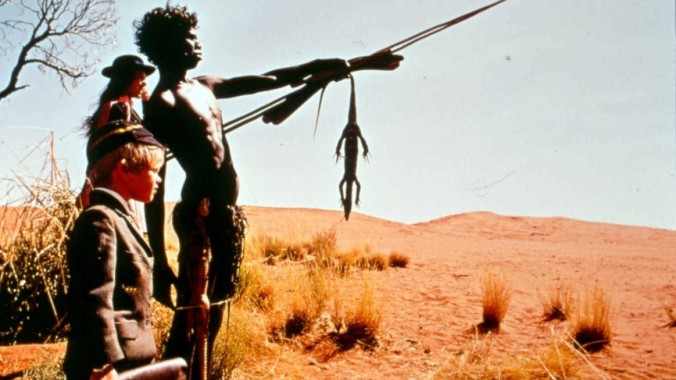“Survival of the fittest” is a term referring to those who best adapt to harsh environmental conditions, surviving and flourishing in spite of them. The ability to earn a large income may best befit individuals raised in a culture of technology. However, those living completely engulfed in nature must be able to gain life’s essential needs as a means for survival. In doing so, they have an immense respect for nature and its gifts towards their endurance. In “Walkabout”, a 1971 Australian-British coming-of-age film directed by Nicolas Roeg, the complex journey of survival is explored through the eyes of children from each of these worlds in the Australian outback.
Jenny Agutter and Luc Roeg play two wealthy suburban children living an industrialized, routine life. On what seems to be a harmless picnic in the stunning Australian Outback, their father (John Meillon) attempted to shoot his children and then took his life. His sheltered children were thus forced to persevere in an extremely rugged environment with limited survival skills suitable for this location. They crossed paths shortly thereafter with an Indigenous teenager (David Gulpilil) on his “walkabout”, a traditional yet obligatory rite of passage into manhood. It involves young Australian Indigenous males spending six months alone in the wilderness forced to fend for themselves but, in turn, reflecting on their own life circumstances and paths. While from vastly different cultural backgrounds, the siblings and the Indigenous male weave an interlaced web of shared survival, abandonment, innocence, joy, actuality, and disappointment. They relish in the glory of nature and youth yet feel repulsed by an uncompromising truth of the real world.
A wild, gorgeous, and vast setting tends to expose the full breadth of human emotions. Lack of availability to amenities or possessions may create frustration but eventually lead to a spiritual freedom. This film’s beautiful, raw cinematography amplifies these sentiments, as the viewers feel engulfed in the exciting, haunting world of the characters. I feel as if an experience such as a walkabout would allow teens to take the imperative time for personal growth, self-discovery, as well as reveal a harsh recognition of the impending realities of adulthood. Regardless of the setting and allotted timeline, each person questions the true meaning of their existence. This act can allow us to reflect and plan towards achieving our ideal essence as humans while simultaneously gaining the tools needed to sustain life.

I do not own the above image.
This is one I heard about and forgot to see. What a fascinating storyline. Thanks for post. I need to find this one 😊
LikeLiked by 1 person
The movie is actually on youtube! That is how I saw it 🙂
LikeLike
Great film 🙂 I am a huge fan of director Nicholas Roeg. I love this blog, keep up the great work as usual 🙂
LikeLiked by 1 person
Thank you so much for your kind words 🙂 It is a great film, and I’m sure it gets better with each viewing!
LikeLike